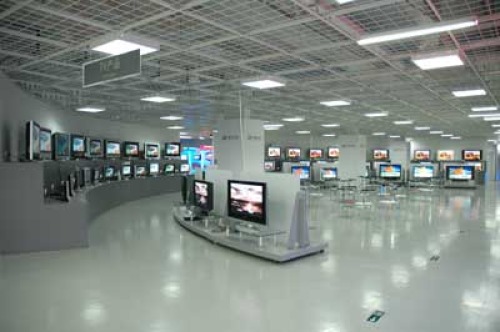
Recently, there are two things in the home appliance market that are intriguing. First, the major quarterly net profit of GOME and Suning sales chain giants declined sharply; the second is that e-commerce leader Jingdong Mall has signed a three-year home appliance procurement agreement with Haier, Samsung and other Chinese and foreign brands for a total of 80 billion yuan. It is almost equivalent to Suning's 2010 revenue. On the other hand, retail sales of home appliances have seen a sudden surge, and the distribution pattern of home appliances is changing.
In the overall downturn of the home appliance market, the performance of home appliance giants is not surprising. The growth of e-commerce companies such as Jingdong Mall brings surprises to the home appliance industry. According to the survey data of China Yikang, from January to February of this year, sales of refrigerators, flat-panel TVs, and washing machines dropped drastically, while online sales increased by 261%, 166%, and 138% respectively. The rapid growth of online home appliance sales, of course, is due to the low base, which also highlights the unique value of online retail channels. Compared with traditional home appliance sales channels, online retail application information technology reduces costs and improves efficiency, eliminating store rental expenses and sales promotion personnel costs. Consumers can shop at any time with the click of a mouse, and can fully understand product information and prices. Low-cost, convenience, and transparency have performed well and won the favor of young consumers.
At present, China's e-commerce is in a period of great development. Aiming at this ever-growing market, the home appliance chain also rushed to the retail network. Suning Tesco has already ranked among the top 3 companies in the industry within two years and is currently spending RMB 1 billion to build a world-class e-commerce headquarters. This year, its online revenue target is locked at RMB 30 billion. With the approval of the Suning 5.5 billion private placement plan, the future will focus on logistics, information development and other back-office construction, and further develop online sales. Gome.com is also ambitious and plans to achieve the top 3 sales in China's comprehensive B2C market within the next two to three years.
Despite the rapid development of online retailing, the popularity of home appliance manufacturers and consumers continues to increase. However, at present, home network purchases still face many bottlenecks, requiring the industry to work steadily and striving to crack.
First, back-office construction must keep up. For e-shops, the background support of information technology and logistics systems is indispensable. Due to the cross-region and decentralized nature of online orders, and the fact that large items such as TVs, refrigerators, and washing machines are different from those of small items such as digital products, this raises higher requirements for e-commerce logistics systems. With the development of home appliance chain, Suning Appliance invested heavily in the distribution of modern logistics warehouses throughout the country, forming a rapid distribution capability, which laid a solid foundation for the network retail. Jingdong Mall also recognizes the importance of logistics system construction and proposes to build 50 to 60 logistics warehouses nationwide in the next three years.
Second, the relationship between online and offline should be well coordinated. At this stage, online sales competition is low price, and the traditional channels of home appliances have formed a set of price system. There is a certain price difference and conflict of interest in selling the same goods. With the continuous increase in online sales, spreads and other issues will become more prominent. In order to avoid a zero-sum game between new and old channels, some e-commerce companies and manufacturers have proposed online and offline products to differentiate themselves, and the main online strategy for customizing household electrical appliances has yet to be observed.
Finally, the profit model needs to be solved. At present, major domestic e-commerce companies rely on low prices to attract traffic, gather popularity, and do large-scale operations. They are still unable to achieve profitability. They are still relying on external blood transfusions and their own investment to support them. The value of channel application for home appliance network sales continues to be prominent, while the profit value cannot be reflected. How to move from price-oriented to value-oriented and service-oriented, and improve the quality and efficiency of the business as soon as possible, is related to the long-term development of retail sales of home appliances. The author believes that e-commerce is still talking about business, not only to fully pay attention to the new situation of network marketing, new features, but also to provide more targeted services to consumers.
Therefore, real concern and in-depth exploration of consumer demand, continuous enhancement of core business abilities, and appropriate profitability in creating greater value for consumers and manufacturing companies may be more feasible for home appliance network retailers out of the woods to achieve healthy development. way of doing.
High Frequency AC Power Supply
Adapter Power Regulated,Ac To Dc Regulated Power Supply,High Voltage Regulated Power Supply,High Voltage High Frequency Power Supply
Yangzhou IdealTek Electronics Co., Ltd. , https://www.idealtekpower.com